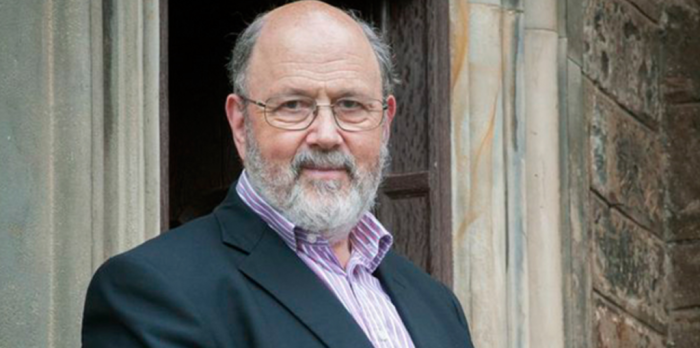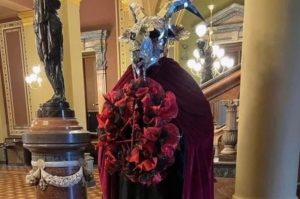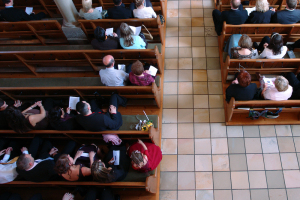An interview with N.T. Wright on how Christ bridges ethnic, gender, class divisions

We live in a time of intense polarization, our society criss-crossed with deep divisions along ethnic lines, gender lines, political lines, and economic lines. Increasingly, the marketplace appears to be one of the few places where many of us are forced to come together, working and trading across these divisions. The way Christians conduct their work lives has incredible potential to reach across these rifts.
Jesus also lived and worked in places that were profoundly fragmented, and it stands to reason He has guidance to offer in this area. Renowned Biblical scholar N.T. Wright (or Tom, as he's asked me to call him) recently published Galatians: Commentaries for Christian Formation, and his analysis of Paul's writing provides incredible insights over a broad scope of topics, including on what it means to model unity to a divided world. I've had the joy of interviewing Tom many times before, and I've always come away with an increased understanding of the timeless wisdom the Bible contains. Our most recent conversation on my podcast Meeting of Minds about his work on Galatians is no exception.
Here are a few excerpts from our conversation, lightly edited for length and clarity:
The Church was the world's first multi-cultural institution
Tom: "It just so happens, weirdly in a way, that I was working on this at the time when, because of the George Floyd business a year ago and so on, both America and Britain had been talking about the relationship between different ethnic or racial groups. Though that's a general social question, not a church question, it's very obvious that the churches on both sides of the Atlantic need to be faced with this question afresh. Since that is what Galatians is all about, maybe it might just help us to get our heads and our hearts into the right mode."
Jerry: "Maybe it's a social question with a church answer."
Tom: "Absolutely. The way I would put it is that the church from the beginning from its first days in certainly Antioch and even in Jerusalem, the church always was a multicultural, multiethnic, multipolychrome, multilingual organization. Like in Revelation, a great company of many nations and kindreds and tribes and tongues, all together praising God and the lamb. That's the vision of the church in the New Testament. We, in the last four or five hundred years, have colluded with division down ethnic lines without even realizing just how unbiblical we were being. We'd taken our eye off that ball and were looking instead at theories of salvation, about going to heaven, which Galatians isn't about."
Jerry: "Was there anything else like that in the ancient world? Ancient world's probably a little too broad, we don't necessarily know what's going on in China or India, but in oikumene, in the Roman world, is there anything else like that?"
Tom: "No, as far as we know the answer is absolutely not. The closest you might get would be in the Roman army, which recruited soldiers from all over from the provinces. But they would all be men and they would all be signed up to be Caesar loyalists as it were. But there was a sort of a polychrome, multiethnic dimension to the Roman army."
Jerry: "Devoted to death instead of life!"
Tom: "Exactly, exactly! When Paul uses the imagery of military weapons in Ephesians 6 or 1 Thessalonians 5, there is a kind of an echo across. 'Well, they're doing it like that, but of course we do it like this.'"
Baptism as a form of gender equality
Tom: "[In the church], you've got a community which includes Jews and Gentiles on equal terms and men and women on equal terms. It's one of the things we often fail to note about the debate about circumcision. It only applies to males, males wear the Jewish badge of membership, whereas baptism, which is a rough equivalent for Paul, is both male and female. I hate to use the word 'inclusive' because that word is so abused these days, but there is this sense of a welcome of all and sundry on the basis of the transformation which comes through baptism and faith. 'I through the law died to the law. I am crucified with the Messiah. Nevertheless, I live yet, not I, but the Messiah lives in me.' That is then the same for everybody. Whether Jew or Gentile, male or female, slave or free, that's the heart of Galatians."
Jerry: "Let's talk about that passage. That's an important passage, and I think to some degree it has been kind of ignored on the conservative side and weaponized on the Progressive side. We're all caught up in a kind of monism that there never should have been distinctions. One of the things that's distinctive about your thought is you add temporality to it. Galatians is often read as though there never should have been a distinction between Jew and Gentile. I think your reading of Galatians is, 'Yes there should, but history has changed. We're in a new phase so it's no longer an appropriate distinction.'"
Tom: "Yes, exactly."
Only the church can model unity
Jerry: "We seem to be in a kind of Galatians moment where we're discussing national identity, fear of persecution, in my world it's Christian nationalism on one hand and progressivism on the other. We seem bewitched, so how would you apply Galatians to now?
Tom: "Yeah, it's funny, I didn't know you were going to ask that but I have a quotation here which I will read out to you. 'The family,' that's the church, 'is called to be a worship-based, spiritually renewed, multiethnic, gender blind in leadership, polychrome, mutually supportive, outward facing, culturally creative, chastity celebrating, socially responsible, fictive kinship group.' That's my Pauline definition of the church. I'll send that to you if you like."
Jerry: "I'd love that!"
Tom: "I read that in an article a few weeks ago. I think what we've seen over the last 400 years in Western society is a church that was so fixated on figuring out how people get to heaven as to ignore the message in all of Paul's letters and right across the New Testament: the unity of the church across all traditional divisions. For me, what Paul says in Galatians about being all one in Christ Jesus is then coming out in celebratory mode in Romans 15:7-13 where he says, 'Therefore, I want you with one heart and voice to glorify God, the Father of our Lord Jesus.' It's when the church is living as a single family precisely across these divisions that it is being assigned to the world that God in Christ has done and is doing a new thing. As long as the church stays in its different ethnic huddles, 'Oh, we are a white church, a black church, a Polish church, a Spanish church,' or whatever. As long as we're doing that, then the principalities and powers think they've won. This is part of the point of Ephesians 1 to 3 as well.
"My response to all the fuss about whether it's Black Lives Matter or whatever, people have said to me. 'Oh Tom, how can you support that?' because it's a Marxist-inspired organization. I know Black Lives Matter itself comes out of that Marxist-inspired social movement, but the point is that the church has been falling asleep on the job! We should have been out there modeling what a multicultural community cheerfully worshipping God together looks like, showing people that it's possible and that if you follow Jesus you can do it."
Jerry: "So these political movements become like fictive kinship groups without any without a messiah to center on."
Tom: "Exactly, which is almost impossible. You can say, 'We want multiculturalism,' but without Jesus, that's really difficult. Some societies have tried it for a while. Europe at the moment is very anxious about that, as we get more and more refugees and immigrants from other parts of the world. Many European countries like Hungary and parts of France are saying, 'Actually we don't want that, we are ourselves, thank you very much. We don't want all these extra people.' In America and Britain we have been melting pot countries, but often we've tried to do it as though it was possible without Jesus. I think the message of Galatians is no. It is a noble dream, but you'll only get there through that route. 'I through the law died to the law. I am crucified with Christ. Nevertheless, I live, yet not I, but Christ lives in me.' That's the center of it all, and the church ought to be modeling that. I hope my commentary will be a word for our times in that respect."
Jerry: "My friend Bishop Joseph Garlington of Reconciliation International has been saying for decades, in an ethnically-divided society, and we can add gender-divided and we don't talk about it enough but generationally-divided, because John is sent to turn the hearts of the fathers to the children, the children to the fathers. Only the church can model unity, which probably doesn't mean imitating existing movements but bringing this distinctively Pauline Christian approach."
Tom: "Yup, a Pauline Christian approach. Revelation 7, the great company which no one could number, of every kindred and nation tribe and tongue. This is not something for which we have to wait, this is a vision of the heavenly community right now. This is what Jesus' people actually look like, and on the rare occasions when you see it in reality in a church building, it is a beautiful thing."
Jerry: "It's powerful."
Tom: "A very powerful thing."
Jerry Bowyer is financial economist, president of Bowyer Research, and author of “The Maker Versus the Takers: What Jesus Really Said About Social Justice and Economics.”





























